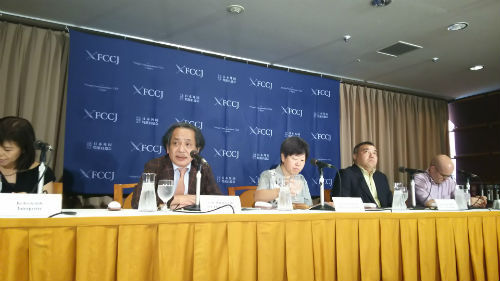
70 Years after the end of World War II, Manabu Sato (Professor Emeritus, University of Tokyo) believes Japan stands at a critical juncture. “One path,” he explains, “is that of a nation that does not wage War; the other, a nation that wages War.” Sato, along with Professor Koichi Nakano (Sophia University), are leaders of an initiative they call the Association of Scholars Opposed to the Security-Related Bills (ASOSB). Prime Minister Shinzo Abe’s government is currently trying to push the bills through the Diet (the Japanese Parliament). Over 9000 scholars, including Nobel Laureate Toshihide Masukawa, Seigo Hirowatari (Former President of Science Council of Japan), Yoichi Higuchi (Member of the Japan Academy), and just as many Japanese citizens, have signed the ASOSB appeal – and the numbers of protesters are rapidly growing. On Friday, July 10, supporters of ASOSB across diverse academic disciplines joined an international press conference to protest the bills which they are calling “not simply unconstitutional but also an attack on the key principles of constitutionalism and the rule of the law.”
Professor Sato and Professor Nakano join me to discuss the issues.
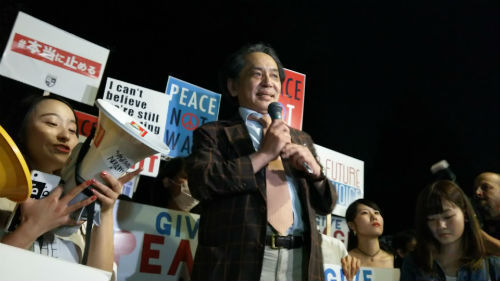
Professors – Why do you and the other signatories oppose this bill? In what way is it unconstitutional?
The Abe administration has submitted an International Peace Support Bill and an omnibus Peace and Security Legislation Consolidation Bill amending 10 war-related laws to the Diet, where they are currently being deliberated. The bills violate Article 9 of the Constitution.
In spring 2013, the Abe government initially sought to lift the constitutional ban on collective self-defense (CSD) that is not recognized by Article 9 by first lowering the voting hurdle of Article 96 of the constitution, which requires a two-third majority in both houses of the Diet to initiate a national referendum on constitutional revision. The claim made at that time was that it was “undemocratic” for a minority (i.e. a third) of the parliamentarians to be able to block a national referendum, thereby “depriving” the people of their voice on constitutional affairs. Having seen a strong civil society reaction against such a change that was deemed to run against the principle of constitutionalism, Abe had to abandon the plan, and that is how he then came around to the idea of simply revising the official government interpretation of the constitution to lift the ban on CSD.
The cabinet decision of July 1st, 2014, which serves as the basis of the current bills, thus represents not only an attack on constitutionalism, but also a most undemocratic and cynical way of gutting the peace constitution of postwar Japan of its substance. Successive governments of the same ruling Liberal Democratic Party, for the entirety of the postwar period, took the official position that Article 9 of the constitution cannot be said to ban the country’s right of individual self-defense in its most minimal fashion, but they have consistently ruled out the possibility of exercising CSD, engaging in other countries’ wars when Japan is not attacked, as unconstitutional.
If adopted, the legislation would allow (1) using military force, even if Japan is not attacked, if another nation is attacked and the administration deems this situation a threat to Japan’s survival; (2) sending SDF units anywhere in the world where the U.S. or other militaries are waging war and having them provide support in close proximity to combat zones, and (3) deploying the SDF alongside U.S. and other allied forces and authorizing them to fire their weapons ostensibly in defense of their military and other supplies.
Well over 90% of constitution law scholars and legal professionals, including not only the Japan Federation of Bar Association, but also former Cabinet Legislation Bureau Chiefs and judges, consider the bills to be unconstitutional. A large majority of the Japanese public also remain unconvinced that the bills are legitimate and in urgent need of enactment. If the government of the day can simply change the interpretation of the constitution just like that with regard to Article 9, it can do anything it wants with all of the other articles of the constitution as well. That is why the bills are not simply unconstitutional but also an attack on the key principle of constitutionalism and the rule of law.
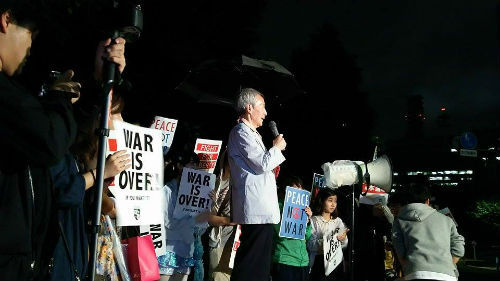
What are your worries for Japan if this bill passes?
Some argue for the above reasons that an equivalent of a coup d’état is basically taking place in front of our eyes. If the bills pass, CSD and military engagements that are generally banned by the constitution would be shifted into the realm of the arbitrary discretion of the government. Abe and his ministers claim that the ban on CSD would only be partially lifted and that there would be many checks and controls over executive decision. However, it is impossible to take the word of a government that seems to think nothing of constitutionalism.
Also, we need to remind ourselves that the Abe government passed the designated secrets law in December 2013, in spite of massive protests and criticisms. That law allows the government to designate “sensitive” information that concerns security (among other things) as state secrets without significant checks from even the legislature, let alone the civil society. It is probable that if the government claims that a situation poses a serious threat to Japan’s survival, even though it is not attacked itself and therefore decides to exercise CSD, it will also designate key information that led to the decision as state secrets, and we will be deprived of any means to challenge and verify the government assertions.
Why is standing up against this bill of crucial importance to scholars and academics in Japan?
Because the Abe government’s attempt to pass the bills that make a mockery of constitutionalism irreparably undermines not only peace but also logic –two key prerequisites for education and scholarship.
Academics who signed the statement of the Association of Scholars take to heart the fact that universities and scholars in Japan collaborated with the war of aggression that brought disastrous consequences to the peoples of the Asia-Pacific region, including the catastrophic loss of lives of many youths and students. Deeply repentant of this history, we vow not to let our students to kill and to be killed ever again.
We thus stand in solidarity with the new students’ group, SEALDs (the Students Emergency Action for Liberal Democracy – s) in opposing the bills. Moreover, our endeavor to pursue knowledge cannot possibly be continued if the government imposes on us its Orwellian slogans of “war is peace,” “freedom is slavery,” and “ignorance is strength.”
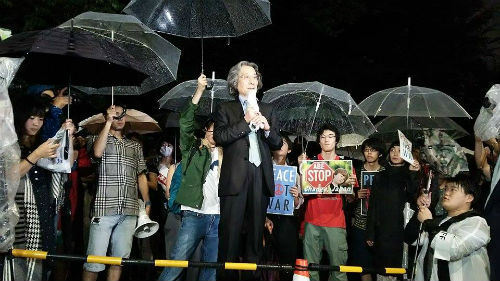
How can the global community of academics help out?
Curbing arbitrary state power is a challenge that citizens all over the world face today. The principles of constitutionalism, the rule of law, and individual rights and liberties were established through the struggles of all mankind, and should not be negated on our watch. Article 97 of the Japanese constitution says, “The fundamental human rights by this Constitution guaranteed to the people of Japan are fruits of the age-old struggle of man to be free; they have survived the many exacting tests for durability and are conferred upon this and future generations in trust, to be held for all time inviolate.”
It is this struggle that we are fighting today against arbitrary state power, and we invite scholars from all over the world to join us. More specifically, we need to challenge the hypocrisy exhibited by many Western governments, including the US, that generally welcome the Abe government’s attempt to lift the ban on CSD, under the name of “pro-active contribution to peace” through which Japan plays a bigger role in defending the “rule of law” in the context of Asia’s maritime and territorial conflicts. The rule of law is indeed a fundamental principle of contemporary order, but it should not be invoked so arbitrarily when it is being infringed upon so openly in Japan with the tacit backing of the US and other countries.

(All photos are courtesy of Professor Manabu Sato)
Join me and globally renowned thought leaders including Sir Michael Barber (UK), Dr. Michael Block (U.S.), Dr. Leon Botstein (U.S.), Professor Clay Christensen (U.S.), Dr. Linda Darling-Hammond (U.S.), Dr. MadhavChavan (India), Professor Michael Fullan (Canada), Professor Howard Gardner (U.S.), Professor Andy Hargreaves (U.S.), Professor Yvonne Hellman (The Netherlands), Professor Kristin Helstad (Norway), Jean Hendrickson (U.S.), Professor Rose Hipkins (New Zealand), Professor Cornelia Hoogland (Canada), Honourable Jeff Johnson (Canada), Mme. Chantal Kaufmann (Belgium), Dr. EijaKauppinen (Finland), State Secretary TapioKosunen (Finland), Professor Dominique Lafontaine (Belgium), Professor Hugh Lauder (UK), Lord Ken Macdonald (UK), Professor Geoff Masters (Australia), Professor Barry McGaw (Australia), Shiv Nadar (India), Professor R. Natarajan (India), Dr. Pak Tee Ng (Singapore), Dr. Denise Pope (US), Sridhar Rajagopalan (India), Dr. Diane Ravitch (U.S.), Richard Wilson Riley (U.S.), Sir Ken Robinson (UK), Professor Pasi Sahlberg (Finland), Professor Manabu Sato (Japan), Andreas Schleicher (PISA, OECD), Dr. Anthony Seldon (UK), Dr. David Shaffer (U.S.), Dr. Kirsten Sivesind (Norway), Chancellor Stephen Spahn (U.S.), Yves Theze (LyceeFrancais U.S.), Professor Charles Ungerleider (Canada), Professor Tony Wagner (U.S.), Sir David Watson (UK), Professor Dylan Wiliam (UK), Dr. Mark Wormald (UK), Professor Theo Wubbels (The Netherlands), Professor Michael Young (UK), and Professor Minxuan Zhang (China) as they explore the big picture education questions that all nations face today.
The Global Search for Education Community Page
C. M. Rubin is the author of two widely read online series for which she received a 2011 Upton Sinclair award, “The Global Search for Education” and “How Will We Read?” She is also the author of three bestselling books, including The Real Alice in Wonderland, is the publisher of CMRubinWorld, and is a Disruptor Foundation Fellow.
Follow C. M. Rubin on Twitter: www.twitter.com/@cmrubinworld



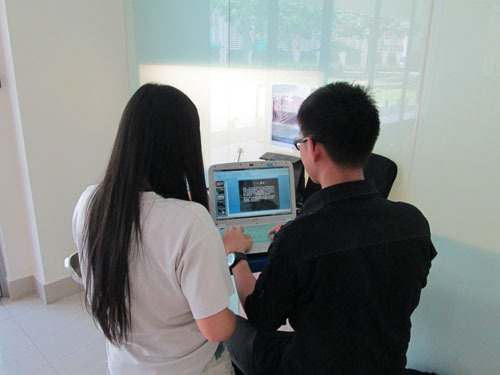
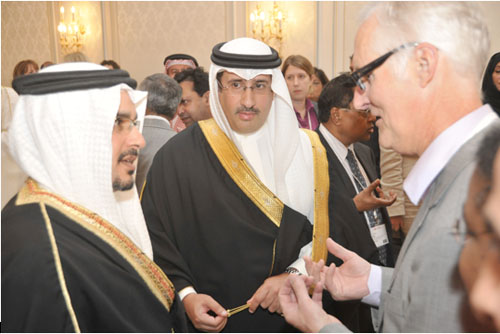
Recent Comments